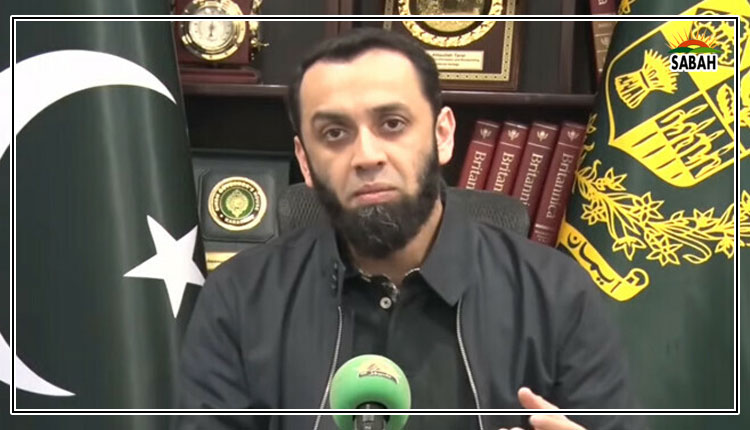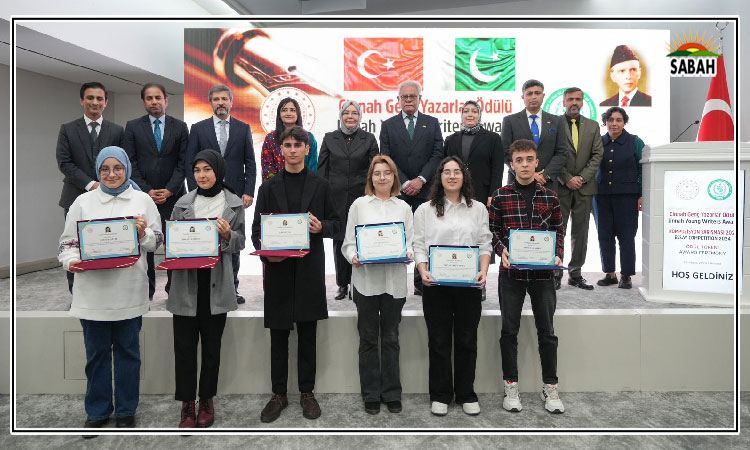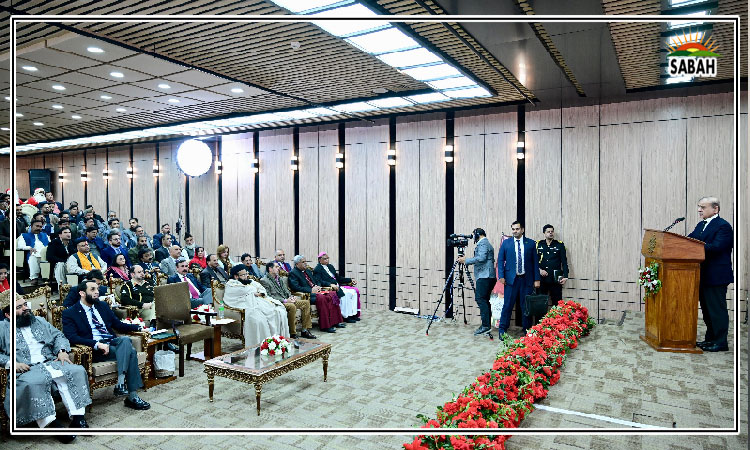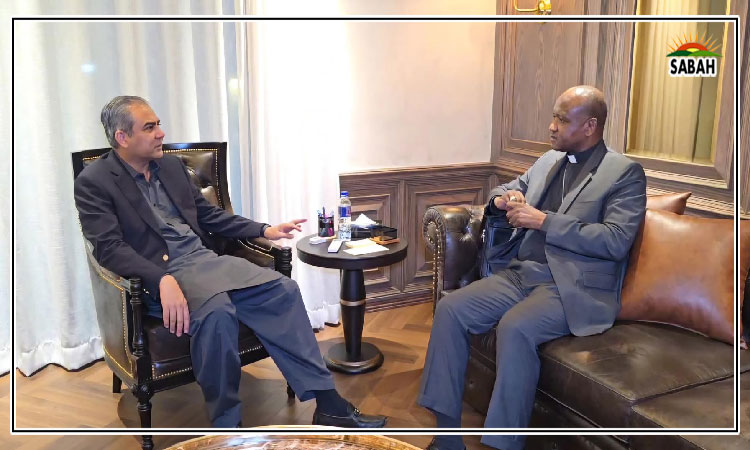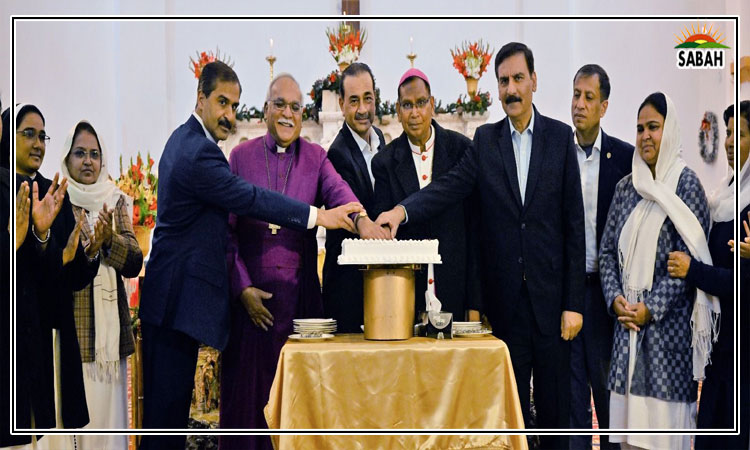Five-member bench of IHC headed by CJ Athar Minallah dismisses show-cause notice, wraps up contempt case against Imran Khan
ISLAMABAD, Oct 03 (SABAH): The Islamabad High Court (IHC) on Monday dismissed the show-cause notice issued to Pakistan Tehreek-e-Insaf (PTI) Chairman and former prime minister Imran Khan for his controversial remarks against Additional District and Sessions Judge (ADSJ) Zeba Chaudhry at an August 20 public rally.
A five-member larger bench, headed by IHC Chief Justice Athar Minallah and comprising Justice Mohsin Akhtar Kayani, Justice Minagul Hassan Aurangzeb, Justice Tariq Mehmood Jahangiri and Justice Babar Sattar, heard the case against Imran Khan on Monday.
During the proceedings, Imran Khan’s lawyer Hamid Khan Advocate told the court that a third reply had been submitted to the court. “We have read your affidavit. Is there anything else you would like to add?” Justice Minallah asked Imran Khan. He went on to say that prima facie this was a contempt of court case but it was being dismissed due to Imran’s conduct.
“We take a lot of care in contempt of court cases,” Justice Minallah went on to say. He said that the IHC was “dismissing” the notice issued to Imran, effectively ending contempt proceedings against the PTI chief. “This is the unanimous decision of the larger bench,” he remarked.
However, the Additional Attorney General Amir Rehman opposed the court’s decision to dismiss the show-cause notice issued to Imran as he pointed to the cases involving Nehal Hashmi, Daniyal Aziz and Talal Chaudhry.
“Are you saying you support the judgments in these cases?” Justice Minallah asked and subsequently told the attorney general to submit a written copy of his reservations in court.
At the outset of Monday’s hearing, IHC CJ Athar Minallah said that the bench has seen the affidavit submitted by Imran Khan. “Imran Khan demonstrated honesty and went to apologise to the judge,” he remarked, adding that discharging the contempt notice is the bench’s unanimous decision.
Justice Minallah also stated that the court is also “satisfied” with Imran Khan’s conduct. While announcing the verdict, the court discharged the contempt of court notice against Imran Khan.
Following the court’s verdict, the PTI chief said that the court has taken a “great decision”.
Earlier, while speaking to the journalists outside the court, the PTI chief said that the party MNAs will not go back to the National Assembly.
The former premier, talking about the return of PML-N Vice President Maryam Nawaz’s passport, said that the nation is upset as these “thieves” are getting NRO II. “It is proved that there is no rule of law in this country,” he responded.
Imran Khan said: “Justice Athar Minallah has taken great decisions [in the past].” He also said that he would appear before the court if needed as he had done in the past.
Standing outside the court, Imran told reporters that he “always believed the IHC passes awesome judgments”.
A journalist retorted that “what you can NRO (a deal) are also court judgments” in a nod to Imran’s recent comments by PTI leaders after the acquittal of PML-N vice president Maryam Nawaz in the Avenfield Apartments’ reference.
“Just like all politicians are not always good, like journalists can be good or bad,” responded Imran, “in the same way some courts’ decisions are good and some are not”.
Earlier on Monday, Imran Khan reached the court amid tight security. Other party leaders Asad Umar and Shah Mahmood Qureshi also arrived at the IHC.
On Sunday, the IHC had granted Imran Khan pre-arrest bail in connection with the case, following the issuance of a warrant for his arrest.
On Saturday, Imran Khan had submitted an affidavit in line with the court’s directions, saying he had realised he “might have crossed a line” in his criticism of Judge Chaudhry and was willing to apologise to her “if she got an impression” that he had crossed a line.
The court had sought the affidavit during a hearing on September 22, when Imran had offered to tender an apology to Judge Chaudhry. Imran’s offer to apologise had seen him escape the indictment.
In the affidavit, Imran said he had “realised during these (contempt) proceedings before the honourable court that he might have crossed a red line”. However, he added, he never intended to threaten Judge Chaudhry and “there was no intention behind the statement to take any action other than legal action”.
He said he wanted to assure the IHC that he was willing to explain and clarify before Judge Chaudhry that“ neither he nor his party seeks/sought any action“ against her and he was willing to apologise to her “if she got an impression that the deponent (Imran) had crossed a line”.
The PTI chief assured the court that in future he would not do anything that would hurt the dignity of any court and the judiciary, especially the lower judiciary.
He also expressed his willingness to take any further steps that the IHC deemed necessary and appropriate. Imran further assured the court that he would always stand by his statement in the affidavit in letter and spirit.
The case goes weeks back to August when Imran Khan, while addressing a rally in Islamabad’s F-9 park, had criticised Judge Zeba Chaudhry after she had approved an extension in the physical remand of his close aide Shahbaz Gill in a sedition case.
Imran Khan had warned the judge, as well as the judiciary, of dire consequences for what he had described as their “biased” attitude towards his party.
Subsequently, the decision to initiate contempt proceedings against Imran was taken by the IHC’s Justice Aamer Farooq on August 22 while hearing a petition challenging Gill’s physical remand. The court had summoned Imran on August 31 and issued him a show-cause notice.
A day before the hearing, the former prime minister had submitted a reply before the IHC wherein he had expressed his willingness to “take back” his words about Judge Chaudhry if they were “regarded as inappropriate”. He had pleaded before the IHC that the judges who had agreed to initiate the case against him should consider withdrawing themselves from the bench as, according to him, they had pre-judged the matter.
However, the IHC had deemed the response to be “unsatisfactory” and asked the PTI chief to submit a “well-considered” response.
Following this, Imran had submitted another reply to the court. In the revised response, Imran had stopped short of rendering an unconditional apology.
On September 8, the IHC had decided to indict Imran, once again calling his response “unsatisfactory”.
However, at the next hearing on September 22, when it was expected that charges would be framed against the PTI chief, Imran had offered to tender an apology to Judge Chaudhry and escaped the indictment.
Following his statement in the court, the larger bench hearing the case had said that it was “satisfied” with the apology and asked the PTI chief to submit an affidavit.
Prior to submitting the affidavit, Imran had appeared before an Islamabad sessions court on Friday to personally apologise to Judge Chaudhry, but his apology was left hanging as the judge was on leave.


